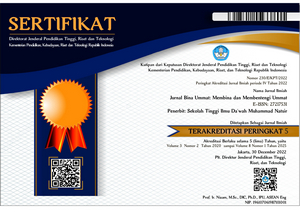DA`WAH THROUGH ONLINE GAME APPLICATIONS (STUDY OF THE DA'WAH STRATEGY OF HAGO FRIENDS OF RELIGION)
DOI:
https://doi.org/10.38214/jurnaldawahstidnatsir.v5i2.141Keywords:
online games, hago, da'wahAbstract
Research Objectives: To find out and describe Hago Friends of Religion's da'wah strategy in spreading Islam through the Hago online game application. Research Methods: Qualitative. Research Results: Hago Friends of Religion in their da'wah through the online game application Hago does the following things; strengthening effective management structures, presenting 24-hour da'wah content, namely morning migration motivation with Hago Friends of Religion, Morning Islamic study with Hago Friends of Religion, One day one juz, Live Evening Reflection with Hago Friends of Religion, Recitation of the holy verses of Al- Qur`an. Presentation of weekly or yearly content, namely Baca Rathib & Al-Kahf, Fadhilah of the Month of Muharram, Maulid Nabi Muhammad ﷺ, Religious month of Ramadan, and weekly evaluations.
Published
How to Cite
Issue
Section

This work is licensed under a Creative Commons Attribution 4.0 International License.
This work is licensed under a Lisensi Creative Commons Atribusi 4.0 Internasional.
Authors who publish with this journal agree to the following terms:
- Authors retain copyright and grant the journal right of first publication with the work simultaneously licensed under a Creative Commons Attribution License that allows others to share the work with an acknowledgment of the work's authorship and initial publication in this journal.
- Authors are able to enter into separate, additional contractual arrangements for the non-exclusive distribution of the journal's published version of the work (e.g., post it to an institutional repository or publish it in a book), with an acknowledgment of its initial publication in this journal.
- Authors are permitted and encouraged to post their work online (e.g., in institutional repositories or on their website) prior to and during the submission process, as it can lead to productive exchanges, as well as earlier and greater citation of published work (See The Effect of Open Access).




